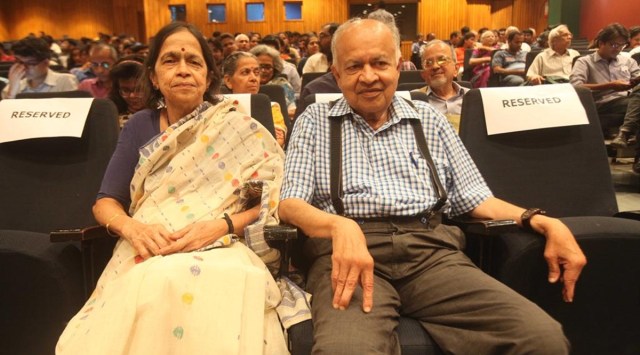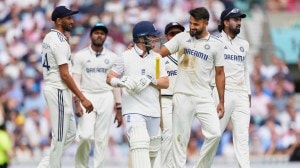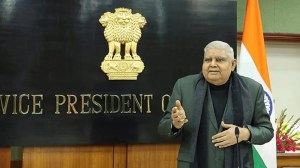Click here to join Express Pune WhatsApp channel and get a curated list of our stories
‘Backbone of IUCAA’: Pune-based mathematician Dr Mangala Narlikar dies at 80
An accomplished mathematician, teacher, science educator and one of the best-known names in Pune, Mangala Narlikar, who was suffering from cancer, died in the early hours of Monday at the age of 80.
 Dr Mangala Narlikar with husband and eminent astrophysicist Prof Jayant Narlikar who was felicitated at a IUCAA function held to celebrate his 80th birthday. (Express photo by Pavan Khengre)
Dr Mangala Narlikar with husband and eminent astrophysicist Prof Jayant Narlikar who was felicitated at a IUCAA function held to celebrate his 80th birthday. (Express photo by Pavan Khengre) During her high-school days, one of her teachers told Mangala Narlikar that she suffered from “a lack of ambition”. Much later in her life when she pondered over the breaks in her research career, she felt her teacher was right. The main reason she did not strive harder and persisted with her research throughout “was, as my old teacher (had) noticed, my lack of ambition”.
An accomplished mathematician, teacher, science educator and one of the best-known names in Pune, Mangala Narlikar, who was suffering from cancer, died in the early hours of Monday at the age of 80. She was more easily identified as the wife of Jayant Narlikar, the celebrated astrophysicist, but only because she often had to prioritise parenting and bringing up her family over her own mathematics research. She is survived by her husband and three daughters, all of whom are in academics.
Born Mangala Rajwade in Mumbai, Narlikar completed her Masters in Mathematics from Mumbai University with first rank, an achievement that made her the recipient of the Chancellor’s gold medal, and then enrolled for research at the TIFR in Mumbai, before her marriage to Jayant Narlikar brought the first discontinuity in her academic career. The couple moved to Cambridge, England, where Jayant made a name for himself globally.
“Fortunately, my husband… respected my wish to study mathematics although he too did not wish me to prioritise career over family,” Mangala wrote later. In Cambridge, she attended a few graduate lecture courses, and supervised some undergraduate students, but full-time research remained difficult with the birth of two daughters.
The couple returned to Mumbai in 1972 with Jayant Narlikar taking up a position at Tata Institute of Fundamental Research (TIFR) in Mumbai. Mangala could resume her interest in mathematics and published several academic papers, mainly concerned with number theory and analytic theory. She also wrote a few books on introductory mathematics, and “enjoyed” teaching mathematics to “bright students as well as those who are afraid of it”. She also contributed to the revision of Math syllabus for school students and was a proponent of rationalism and scientific attitude.
“My story is perhaps a representation of the lives of many women of my generation who are well educated but always put household responsibilities before their personal careers,” she wrote later. The couple moved to Pune in 1980 where Jayant Narlikar became the founder-director of Inter-University Centre for Astronomy and Astrophysics (IUCAA), which has now evolved into one of the finest research institutions in the country. Jayant and Mangala Narlikar have been a permanent fixture on the IUCAA campus ever since. It was only in the last few years that old age and ill-health kept them confined to their home.
“Her death is a shattering news,” Somak Raychaudhuri, Vice-Chancellor of Ashoka University and a former director of IUCAA said. “I knew her since the mid-1980s long before our IUCAA days. She has been a constant source of inspiration and wisdom. She was foremost an intelligent witty academic, but without intending to, she had a motherly presence over the whole institute. Also, she held JVN’s (Jayant Narlikar’s) life together, which in turn affected the whole institute,” according to Raychaudhuri.
He recalled his days as dean of Presidency University in Kolkata when, in 2015, the couple had been invited for a ceremony where Jayant Narlikar was to be conferred with an honorary doctorate. “We invited both of them and asked Dr Mangala to give a public talk. She gave an amazing talk on ‘Analytical Thinking’ to an audience of students from many colleges in Kolkata, and led a very intense discussion that opened up many minds. That day, I saw the best example of her academic thinking and her engagement with young people,” Raychaudhuri said.
Tarun Souradeep, among the first students at IUCAA and now director of the Bengaluru-based Raman Research Institute, said Mangala Narlikar was a “strong rationalist and naturalist of a very high intellect”. “She brought to bear not only her profession as mathematician but in every bit of her daily life. She was also magnanimously generous in parting with her wealth of knowledge to others,” he said.
“We came in as the first batch of students within the first year of her move from TIFR Mumbai with Professor Jayant Narlikar to set up a new institution. To us, and to her, we felt part of a family. In retrospect, as we grew into family life, we learnt to appreciate the enormous strength it would have taken her to move from a well-settled life in TIFR to a new adventure with three young kids, while possibly fending off her first tryst with the disease that finally took her away from us. And yet, she continued to provide unstinted support in building up IUCAA. Many of the diverse and beautiful trees on the IUCAA campus were planted by her,” said Souradeep. “Sucheta (Tarun’s wife, also a mathematician) and I met her two months ago in Pune. While clearly tired, and with a very weak body, she retained her radiant face, bright and alert eyes, and the positivity that has always been demonstrative of her inner strength,” he said.
Mangala felt satisfied with the fact that her three daughters had all carried on with their professional lives along with their family responsibilities. Particle physicist Rohini Godbole said Mangala had left a powerful impression on her when she first met her. “The earliest memories I have of Dr Mangala Narlikar are from my days as a young post-doctoral fellow in TIFR when she was not yet a ‘doctor’. In the beginning, I did not know that she herself was a mathematician, till I met her in the library and she explained to me in her quiet way that after quite some break, she was back to doing, in her spare time, mathematics in general and number theory in particular…Here was one who had kept her contact with science alive after marriage and had resumed research after her two daughters were born,” Godbole, a professor at the Centre for High Energy Physics, Indian Institute of Science, Bengaluru, said.
“I was then and have always been impressed with the quiet strength that one felt while being around her… Her very simple and honest account of her journey in science was indeed very typical of women of her generation, roughly a decade ahead of my own. Since we both came from Pune and rather similar backgrounds, I could relate to many things in her story,” said Godbole. Mangala herself, however, thought that there was much more she could have done, and regretted the fact that she had not studied Physics along with Mathematics.
“I was advised that the maths courses in science as well as the arts streams were the same and MA (Maths) and MSc (Maths) were valued equally, so I should join for the arts stream and not waste my time doing physics and chemistry practicals in the afternoons. I could devote time to other hobbies like reading and painting. So that is what I did. The other subjects I studied in the first two years of college were world history, economics, civics and Sanskrit. I enjoyed them all. Later on, however, I realised that though I enjoyed studying pure maths, I was not familiar with a lot of applications of maths because I had not studied physics enough,” she wrote in a 2009 account.
“I would now advise anyone who wants to study maths to choose MSc with Maths as it also includes studying physics at a respectable level,” she wrote.
Noted theoretical physicist professor Naresh Dadhich, who has also been a director of IUCAA, said, “Mangala was really the pillar of strength to Jayant Narlikar and to all of us in the extended IUCAA family. Whenever one needed some help or wise counsel, the person to turn to was always her. When I saw her about a month ago, she said it was not true living. From IUCAA, we followed them in Khagol (celestial sphere)- perhaps we had the longest togetherness of over 34 years,” said professor Dadhich.
Professor Raghunathan Srianand, director of IUCAA, said Dr Mangala was a multi-faceted personality and a very strong proponent of women in science. “Dr Mangala Narlikar was suffering from cancer and the last few months were difficult due to old age-related problems. However, she was extremely positive and was a huge pillar of support for Dr Jayant Narlikar. We are going to miss her,” he said.
Arvind Paranjpye, director of Nehru Planetarium, Mumbai, said Dr Mangala’s death was a huge loss for India’s scientific community. “She dedicated her life to teaching mathematics and science in India. She has written several books for school students on mathematics in English, Hindi and Marathi,” he said, adding that she also dedicated time for scientific outreach across the entire nation.
In Pune, she used to teach mathematics to school and college students and is remembered by generations of students who learned from her. “I remember she would tell teachers at training workshops that mathematics was extremely easy. You must remember 0-9 numbers and four signs of division/multiplication/addition and subtraction is what she would say at these training programmes…,” he said.
Dr Debiprosad Duari, former director of M P Birla Institute of Fundamental Research, Kolkata, who did his thesis under Professor Jayant Narlikar remembers Dr Mangala Narlikar as an extremely caring person. “In the late 1980s, we were one big family at IUCAA and Dr Mangala Narlikar was not just this grand dame of IUCAA but a mother-like figure to us,” he added.
Professor Sunil Bhagwat, director of Indian Institutes of Science Education and Research, Pune, said, “Dr. Managala Narlikar was a source of inspiration to many young students. She was a valuable member of the entire research and education community, not only that of mathematics. Our thoughts and prayers are with her family at this time. As we mourn this loss, we also know for certain that Dr. Mangala Narlikar’s life will continue to be an inspiration to many.”
The IUCAA family in their post has said that she was the strongest supporter of the IUCAA founder and her husband Professor Jayant Narlikar and instrumental in the birth and evolution of the institute itself. As a cancer survivor, she has inspired and advised many others affected by it for many years. It is sad that after another fight against a relapse, she could not put up further and passed away early Monday morning.
Click here to join Express Pune WhatsApp channel and get a curated list of our stories













